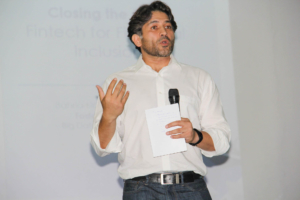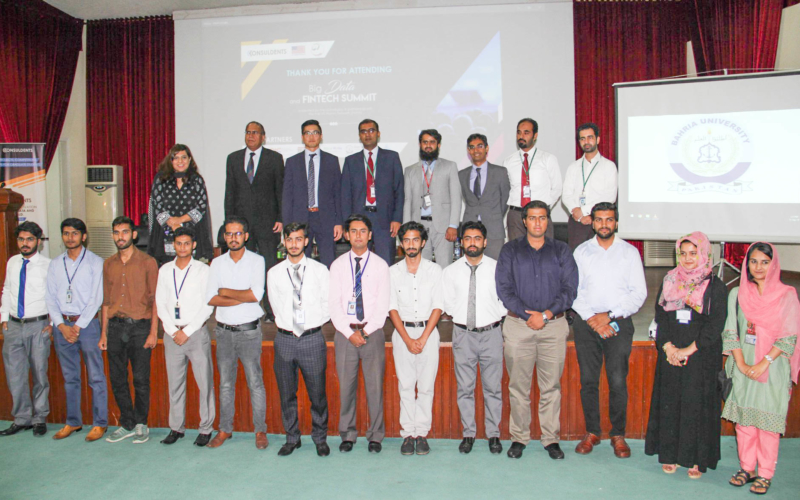The rapid pace of technological and digital change is giving rise to new challenges, opportunities and some compelling questions. To answer these questions and convert the challenges into future opportunities; industry leaders, tech innovators, researchers, academia, decision-makers and investors put their heads together during Fostering Innovation Summit (FIS) 2018.
Fulbright alumnus, Khurram Lalani, with the support of the U.S. Embassy and Pakistan U.S. Alumni Network put forth the opportunity for graduate students to listen to the best minds in Big Data, Fintech and Artificial Intelligence; and prepare themselves for future opportunities.
With more than 700 participants, 10 speakers and many exhibiting brands, alumni grantee, Khurram Lalani, presented one of the biggest industry academia summits in Pakistan featuring multiple sessions on Big Data, FinTech, Robotics and Artificial Intelligence (AI).
Fostering Innovation Summit 2018: Big Data and FinTech
The rising questions of Big Data and FinTech threaded through the topics discussed during the first session of the FIS, held at Bahria University Islamabad.
Mr. Ghazanfar Ali, Country General Manager, IBM and one of the conference’s keynote speaker, discusses the future of Big Data in Pakistan and what startups need to do today to leverage consumer insights.
Assistant Country Director, UNDP Pakistan, Mr. Shakeel Ahmad, in an insightful session on Sustainable Development Goals (SDGs) shed light on how Big Data can help transform Pakistan’s development objectives and effectively provide answers to myriad social problems faced by the country.
Following the discussion, participants were given insight into the benefits and harms of Big Data and its effects on cybersecurity. Through specific case studies and knowledge of cybercrime information, participants were encouraged to critically think on Big Data’s massive influence on various economic industries.
Representing Fintech sector of Pakistan, Mr. Noman Azhar, Country Head – Branchless Banking & Digital Implementation at JS Bank, discussed the future of digital banking with the audience and how Pakistani students can innovate amidst future challenges.

Executive Vice President of the Digital Financial Services at FINCA and PUAN alumnus, Tughral Ali, speaking at the summit.
Executive Vice President of the Digital Financial Services at FINCA and PUAN alumnus, Tughral Ali, concluded with the message that innovators and policymakers should listen to the people who are at the bottom of the Pyramid before designing any intervention for them. Financial inclusion can only be understood through Financial Exclusion.
Fostering Innovation Summit 2018: Robotics and Artificial Intelligence (AI)
Technology is evolving faster than ever, and as it continuously changes, the world changes along with it. As we gear up for the Fourth Industrial Revolution (4IR), concerns over automation, and the impact on jobs and employment are also growing.
The second session of Fostering Innovation Summit 2018 focused on robotics and artificial intelligence, analyzed in detail Pakistan’s preparedness to avail the full potential and economic rewards of the most recent phase of industrialization.
Mr Yusuf Hussain, CEO Ignite, while addressing the gathering of more than 500 students at NUST university, emphasized on the need of honing the technical skills of the country’s human resource. Mr. Imtiaz Rastgar, founder and Chairman of Rastgar Group, echoing CEO Ignite, explored the growing connection of industry 4.0 and robotics in Pakistan’s context.
Morality in Forth Industrial Revolution:
Pakistan’s most revered scientist and social commentator, Pervaiz Hood in his keynote address focused on the problems surrounding the construction of intelligent agents. He discussed the possible implications of the Fourth Industrial Revolution on the morality and ethics that are the foundation of every society. He said that the progress in AI and robotics research should include the element of social benefit. It is important that the decision AI systems will make in the future should be virtuous and according to the moral code set by the humans, he said.
U.S. commitment to building capacity in Science and Technology:
U.S Public Diplomacy Officer, Yoon Nam, in his concluding remarks reiterated the U.S. Government’s commitment to assist the Government of Pakistan and its youth in building its capacity in the field of science and technology. The U.S. Government will continue to provide support to Pakistan in developing the industries of the future and harnessing science and technology to help address important challenges faced by the country, he remarked.
A Final Note:
Khurram Lalani, would like to thank all participants and speakers for attending the FIS Summit and closed the summit with the following remarks,
“Innovation does not happen by itself. Problems need to be identified, and ideas should be translated into projects. Those projects further need to be tested, implemented, and shared by wider communities to become long-lasting sustainable solutions.”


